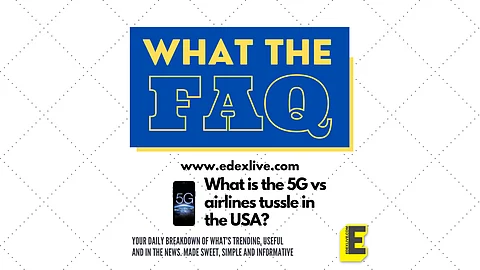

The rollout of 5G in the US was meant to be a landmark event in the field of communication. Or is it really? Because airline companies have come out in strong opposition to the move. But why are they doing so? What is the concern behind the technology being introduced near airports? We know you are pondering about it so we have got it all covered right here.
Read this edition of What The FAQ to know all about this tussle between the telecom and aviation industry.
Why are airline companies opposing the rollout?
Airlines are concerned about the 5G rollout due to safety concerns. This is due to possible interference with airplanes' radio altimeters (used to measure height) which can operate at the same frequencies as the 5G signals, particularly during bad weather. Altimeters operate in the 4.2-4.4 GHz range and this is quite close to the 3.7-3.98 GHz range of 5G that the US auctioned to mobile companies at the beginning of last year. US airlines have cautioned that this could affect up to four per cent of daily flights.
Which airlines have been affected due to this?
Emirates, All Nippon Airways, Japan Airlines and Lufthansa have decided to switch away from aircrafts that are adversely affected due to the 5G signals including Boeing 777 and Boeing 747-8. Even Air India has cancelled flights to Chicago, Newark, New York and San Francisco. Other airlines that have been affected include Hong Kong's Cathay Pacific, Taiwan's EVA Air, Austrian Airlines and Korean Air.
What is the Federal Aviation Administration (FAA) saying?
FAA has said that 5G interference with the aircraft's radio altimeter could prevent engine and braking systems from transitioning to landing mode, which could even stop an aircraft from coming to a halt on the runway while landing. The administration will allow only planes with accurate and reliable altimeters to operate around high-power 5G. Planes with older equipment will not be allowed to make landings under low-visibility conditions.
Will it be of any concern when 5G arrives in India?
Fortunately, Indian air traffic is unlikely to be affected when 5G rolls out since the telecom industries have been directed by the Telecom Regulatory Authority of India to utilise the 3.3-3.67 GHz range for signals. This means that there is a wider buffer of 530 MHz between the highest range of the telecom signal band and the lowest range of the altimeter band (4.2 GHz). Hence, the problem is resolved due to no chances of the two signals interfering with each other.
